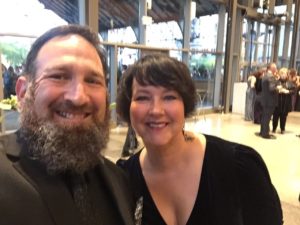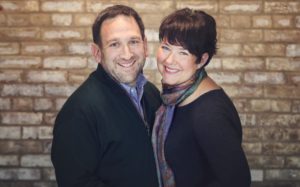Almost immediately following Cassie’s Stage IV metastatic breast cancer diagnosis, she started thinking about her death. Not so much “is there a heaven and hell” but more logistics – like will she be cremated? Buried? What will the memorial service be like? What music will we have? How do we reconcile our different religions? What will her obituary say?
It turns out that Cassie has been focused on her own funeral since junior high. She still has a sketched-out version of her funeral program that she did in 7th or 8th grade. (So, to her friends from Cotter Junior High, she is officially rescinding your pallbearer invitations. Sorry.) And, Cassie’s mom told her that many years ago she had selected scripture readings for her funeral that she had written out and given to her for safekeeping. So to Kay, we should probably get those back.
To Dan though, this all seemed way too soon and way too sad to think about. He knew we were going to have to talk about it at some point, and plan it all out eventually, but to him that meant later. In a few years. Certainly not so soon after the diagnosis.
Conversely, Cassie realized that her fixation on the details of death, while upsetting to Dan and probably unnerving to friends, actually gave her a much needed sense of control. So much about the illness was (and still is) beyond our control, but this wasn’t. And Cassie is an organizer and a planner and planning for her own death felt aligned with her natural tendencies and strengths.
This was one of the first times where we saw things really differently.
So knowing how important this was to Cassie, we came up with a compromise, which like many other things in our lives right now was developed with a heavy dose of dark humor. Here’s the deal we made with each other. We would start talking about the end of life issues but we would always have the conversations at a brewery to take some of the edge off. It’s not a perfect solution by any means but it makes the hard conversations just a little easier.
As we started talking about end of life plans other differences emerged. Dan expressed his desire to have Cassie buried. Cassie felt strongly about being cremated. So, we decided she’d be cremated and then buried. We toured a couple of cemeteries. Cassie is Catholic and Dan is Jewish so it is important for us to find a cemetery that is non-denominational and welcoming for both of us. We also want something near St Paul and easy to get to.
(Here’s a tip – when you’re just trying to get a feel of a cemetery, don’t make an appointment. Just drive or walk around. Check out the grounds and views. See how it feels. For the first place we visited we made the mistake of making an appointment. The cemetery man was akin to the worst car salesman you’ve ever met. “What can I do to get you to buy a cemetery plot today? I can talk to my manager and get you 20% off.” Seriously it could have been a f***ing SNL sketch. We spent the entire time kicking each other under the table and suppressing giggles.)
We talked about funeral music, where we might have the service, and whether or not Dan could do a version of a Shivah at our home. We talked about our religious differences. Cassie had preliminary discussions with her parents about their thoughts (not an easy conversation but none of this is and they were awesome, by the way) and we even talked to two potential officiants.
Then Cassie slowed her roll. As she became more settled into her illness and into how to live with metastatic breast cancer she feels less of the need to focus on end of life planning. But then something strange happened — we reversed roles after Dan’s mom died. Seeing how suddenly Dan’s mom’s health deteriorated and how she went from being fine to not being able to answer even the simplest of questions Dan became terrified that the same might happen to Cassie at some point. Not likely but possible. So now Dan feels some urgency to dive into more of the death details.
All of this has made us realize how we have to be open to each other’s timelines and evolving priorities. Nothing about this can ever really be written in stone. There is no right way or time to discuss any of this. We both just have to commit to communicating about what’s important to us and when — even if that changes often. So now, having recognized all that, we are proceeding — not at a crazy pace but we are letting ourselves go there and think and talk about the end when either of us needs to. And we still try to do it at a brewery.

